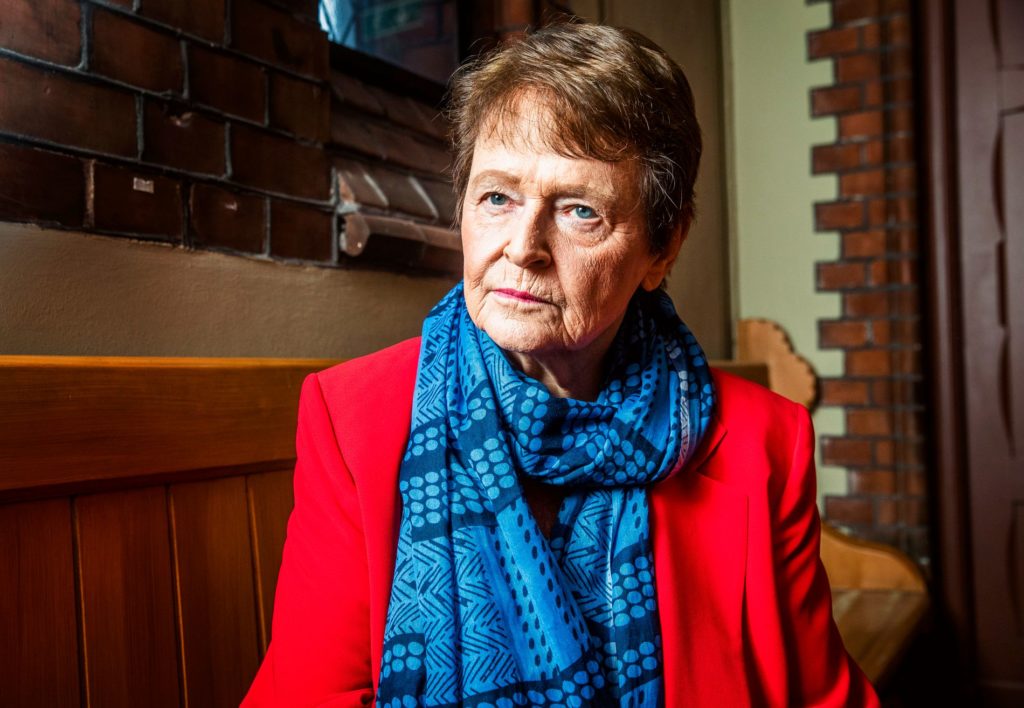
The Global Preparedness Monitoring Board (GPMB), co-convened by the World Bank and the World Health Organization (WHO), warned that epidemic-prone viral diseases like Ebola, flu, and SARS are increasingly tough to manage in a world dominated by lengthy conflicts, fragile states, and forced migration. “The threat of a pandemic spreading around the globe is a real one,” the group said in a report released on 18. September 2019. “A quick-moving pathogen has the potential to kill tens of millions of people, disrupt economies and destabilize national security.” While some governments and international agencies have made efforts to be vigilant and prepare for major disease outbreaks since the devastating 2014-2016 Ebola outbreak in West Africa, those efforts are “grossly insufficient”, the GPMB’s report said.
The WHO also warned earlier in 2019 that another pandemic of flu is inevitable, and said the world should prepare for it. Photo: Frode Hansen
Expert group outlines steps to prepare for – and mitigate – the effects of a widespread global health emergency that could kill millions, damage global economy
18 September 2019, New York – Governments and international institutions must take bold steps to manage the mounting threat of deadly disease outbreaks. This is the stark warning of a report released today by an international group of experts, which outlines concrete actions to prepare the world for health emergencies, recognizing that investing in preparedness before a crisis strikes saves lives and saves money.
Despite the increasingly dire risk of widespread epidemics, the world remains unprepared. The Global Preparedness Monitoring Board (GPMB) warns that epidemic-prone diseases like Ebola, influenza, and SARS are increasingly difficult to manage in the face of prolonged conflict, fragile states, and forced migration. At the same time, the threat of a pandemic spreading around the globe is a real one – a quick-moving pathogen has the potential to kill tens of millions of people, disrupt economies, and destabilize national security. Climate change, urbanization, and a lack of adequate water and sanitation are all breeding grounds for fast-spreading, catastrophic outbreaks.
“For too long, world leaders’ approaches to health emergencies have been characterized by a cycle of panic and neglect,” said Dr. Gro Harlem Brundtland, co-chair of the GPMB. “It is high time for urgent and sustained action. This must include increased funding at the community, national and international levels to prevent the spread of outbreaks. It also requires leaders to take proactive steps to strengthen preparedness coordination mechanisms across governments and society to respond quickly to an emergency.”
The report emphasizes that although governments and international institutions have taken steps to increase preparedness for outbreaks since the deadly Ebola crisis in West Africa five years ago, current preparedness efforts are grossly insufficient. The current Ebola outbreak in the Democratic Republic of the Congo demonstrates how the lack of trust between communities and authorities can undermine the response during a health emergency. By contrast, after people infected with the virus crossed the border to Uganda this past summer, public health authorities, health care workers, and community volunteers were at the ready, with a preparedness plan in place. The cases were quickly detected and isolated before anybody else could be infected.
“The trust between communities and the institutions that serve them is at the core of emergency response, but it is almost impossible to build trust in the middle of a crisis,” said GPMB co-chair Mr Elhadj As Sy, the Secretary General of the International Federation of Red Cross and Red Crescent Societies. “Community engagement and trust cannot be an afterthought, it has to be earned. Leaders and public health authorities must work as partners with communities to build that trust. We can’t just show up once a health crisis hits. We need to be there before, during and after.
”The report highlights that an outbreak equivalent to the 1918 influenza pandemic could kill an estimated 50 to 80 million people, spreading around the world in less than 36 hours and wiping out nearly five percent of the global economy. In the case of a pandemic, many national health systems would collapse, with low-resourced communities hit the hardest.
“Ebola, cholera, measles – the most severe disease outbreaks usually occur in the places with the weakest health systems,” said WHO Director-General Dr Tedros Adhanom Ghebreyesus. “As leaders of nations, communities and international agencies, we must take responsibility for emergency preparedness, and heed the lessons these outbreaks are teaching us. We have to ‘fix the roof before the rain comes.’”
As noted in the report, some recent progress on scaling up in-country preparedness. As of July 2019, 59 countries developed a National Action Plan for Health Security, yet, none of them have been fully financed. In order to be fully prepared, all countries must create a fully costed and financed action plan, with international funders stepping in to close gaps for the poorest and most vulnerable countries.
“Poverty and fragility exacerbate outbreaks of infectious disease and help create the conditions for pandemics to take hold”, said Axel van Trotsenburg, Acting CEO of the World Bank, which is a co-convener of the GPMB along with WHO. “Investing in stronger institutions and health systems will promote resilience, economic stability, and global health security.”
In the report, the GPMB urges leaders to follow through on seven urgent actions (detailed below) to ensure the world is better prepared for the next health emergency. It calls on heads of state and governments to increase funding for preparedness and research into new technologies, strengthen response systems across sectors and follow through on international commitments. At the international level, the GPMB calls for intergovernmental organizations, donors and multilateral institutions to build preparedness into funding mechanisms, strengthen coordination and rapid communication systems, and monitor progress continually.
-ENDS-
Notes to the Editor:
GPMB: Actions for Leaders to Take
The report calls for seven urgent actions to prepare the world for health emergencies, calling on:
1. Heads of Government to commit to preparedness by fully implementing the International Health Regulations, and increasing investment in preparedness as an integral part of national and international security;
2. G7, G20, G77 Member Countries, and regional intergovernmental organizations to follow through on their funding and political commitments for preparedness and regularly monitor progress at annual meetings;
3. All countries to build strong preparedness systems, with heads of government appointing a high-level coordinator to lead efforts across all government departments and sectors, to prioritize community involvement and to routinely conduct multisectoral simulation exercises;
4. Countries, donors and multilateral institutions to prepare for worst-case scenario of a fast-moving pandemic due to a virulent respiratory pathogen by scaling-up research and development for new vaccines and medicines, surge manufacturing capacity and rapid information sharing systems;
5. The IMF, World Bank Group, and international financing organizations to integrate preparedness into their replenishments, national and international financial risk assessments, incentive systems and funding mechanisms;
6. Development assistance funders to create incentives and increase funding for preparedness to fill financing gaps for the poorest and most vulnerable countries and Member States to increase their contributions to WHO for its preparedness and response support to counties and a sustainable Contingency Fund for Emergencies; and
7. The United Nations to strengthen preparedness and epidemic response coordination at the international level.
About the GPMB
As an independent monitoring and advocacy body, the GPMB urges political action to prepare for and mitigate the effects of global health emergencies. Co-convened by the World Bank Group and the WHO, the GPMB works independently to provide expert assessments and recommendations on the state of global preparedness. The opinions and recommendations contained in the GPMB report are those of the Board and do not necessarily represent the views of the World Bank Group and WHO.
The 15-member Board is made up of political leaders, heads of agencies, and experts, led jointly by Dr Gro Harlem Brundtland, former Prime Minister of Norway and former Director-General of the WHO, and Mr Elhadj As Sy, Secretary General of the International Federation of Red Cross and Red Crescent Societies.
Future work of the GPMB will include monitoring progress on this report’s recommendations and assessing the world’s preparedness for health emergencies caused by non-biological risks, including natural disasters. The GPMB aims to advocate at the highest levels so that commitments to preparedness remain high on the political agenda. A full list of board members can be found on the GPMB’s website.
Media Contacts: Fionna Tod, +44 7510 518154, ftod@globalhealthstrategies.com John Butler, +44 7502 203498, jbutler@globalhealthstrategies.com




30 Comments
Pingback: COVID-19: Omicron. Keep yourself and others safe. Do it all! - Bergensia
Pingback: seo plan for ecommerce website
Pingback: bass type beat
Pingback: สอนแทงบอลออนไลน์ ผ่านหน้าเว็บไซต์ Lsm99bet
Pingback: สล็oต pg เว็บตรงแตกหนัก
Pingback: lucabet
Pingback: healty eating
Pingback: ทดลองเล่นสล็อต PG SLOT
Pingback: อัตราจ่ายหวยไทยและหวยหุ้นของ UWIN789
Pingback: gg9bet มีเกมสล็อตอะไรที่น่าสนใจบ้าง?
Pingback: 1ufabet เว็บตรง แทงบอล มาแรงอันดับ 1
Pingback: เช่าที่เก็บของ
Pingback: Baト殕antトアyトア aテァ
Pingback: altogel
Pingback: couples massage
Pingback: ยาตราใบห่อ
Pingback: Dragon Hatch 2
Pingback: Angela
Pingback: snuscore
Pingback: click here
Pingback: เว็บสล็อตเว็บตรง
Pingback: ufa777
Pingback: EV Charger
Pingback: pg168
Pingback: บาคาร่า168 เว็บตรง
Pingback: ติดต่อโรงงานจีน
Pingback: เว็บพนันออนไลน์เกาหลี
Pingback: โคมไฟ
Pingback: Forex Broker Rankings
Pingback: หวยออนไลน์ 24 ชม กับ LSM99 เว็บหวยออนไลน์ บาทละ 1000